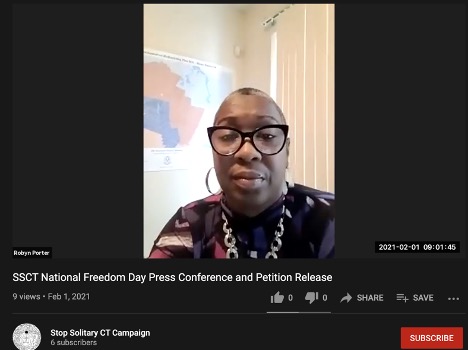Activists and legislators push bill to stop solitary confinement and shutter Northern Correctional Institute

Talat Aman
Feb. 1 marks National Freedom Day, a holiday that honors the abolition of slavery in the United States. For the holiday’s 156th anniversary, Stop Solitary Connecticut hosted a press conference Monday morning to build support for a piece of legislation they say embodies the holiday’s spirit: the PROTECT Act.
The Promoting Responsible Oversight and Treatment, and Ensuring Correctional Transparency Act aims to end solitary confinement in Connecticut and close the Northern Correctional Institution, a maximum-security prison located in Somers. State Sen. Gary Winfield, D-New Haven, the co-chair of the Judiciary Committee, will submit the bill to the Judiciary Committee and will soon hold a public hearing on it.
Stop Solitary has organized for an end to solitary confinement since 2017. As of Monday, the organization has collected 1,000 signatures on a petition calling for the state government to take up the bill. At Monday’s virtual Zoom event, legislators and advocates, many of whom brought personal or familial experiences with solitary confinement, stressed the toll the practice can have on prisoners’ mental health.
“We go to the extreme to dehumanize people that are serving time for crimes that they have been convicted of,” state Rep. Robyn Porter, D-Hamden, said on the call. “The loss of freedom is enough punishment — solitary confinement is inhumane.”
Winfield agreed. He told those in attendance that though the state is tasked with overseeing incarcerated individuals, it has not fulfilled its responsibilities to protect their well-being.
Three mothers on the call described the mental and physical trauma that the Department of Correction’s practices have inflicted on their sons. One of these mothers, Colleen Lord, described her son Robby’s death at New Haven Correctional Center. Lord said her son was sprayed with pepper spray meant for riot control. He died while chained to a metal cot in a solitary confinement cell.
The Connecticut Office of the Chief Medical Examiner ruled the death a homicide. Lord says that an oversight body — such as one written into the PROTECT Act — could have saved his life. She added that she believes that the state must invest in resources for prisoners like mental health treatment.
“I have learned in the past two years since my son was killed that the injustice must end,” Lord said. “If anything good can come from Robby’s death, then his extreme suffering won’t have been for nothing.”
Advocates also hailed the PROTECT Act’s goal to shut down what they described as inhumane conditions at the Northern Correctional Institution. State Rep. Steve Stafstrom, D-Bridgeport, described the conditions that he witnessed on his recent visit to Northern Correctional as “barbaric.” He said that it was designed to deprive inmates of their dignity through structural features like narrow corridors that embody a past vision of “law and order” politics.
Department of Correction spokesperson Karen Martucci told the CT Mirror last week that the DOC uses practices like solitary confinement sparingly. Martucci said in a statement that the department is “leading the country as a correctional system that has minimized a reliance on the use of Administrative Segregation, which is often referred to as solitary confinement.” She also told the Mirror that less than 0.3 percent of the overall population is being held in such confinement.
Barbara Fair, an organizer with Stop Solitary, reflected on seeing her own 17-year-old son in shackles at the visiting room at Northern Correctional Institution.
Fair said that she believes one reason that the state has failed to act is that inmates who are put in solitary confinement are disproportionately Black. According to the state DOC, 92.7 percent of the inmates at Northern Correctional Institute are Black or Latino.
“A lot of white people don’t know anything about Northern; they don’t care; it’s not their problem,” Fair said. “But there are also people who don’t know, but once they do know, we can get them on our side.”
Just last February, a U.N. expert cited the Connecticut DOC’s use of “prolonged or indefinite isolation, excessive use of in-cell restraints and needlessly intrusive strip searches” as tantamount to torture.
Amid the COVID-19 pandemic, speakers at Monday morning’s press conference expressed hope that the PROTECT Act’s accountability measures will prevent future deaths caused by incarceral negligence.
The DOC website indicates that 3,735 inmates have contracted COVID-19 as of Feb. 1. A total of 19 inmates have died. Until last September, the DOC was transferring many inmates to the Northern Correctional Institution to isolate the infected prisoners — drawing harsh criticism from the American Civil Liberties Union of Connecticut and Stop Solitary.
The organization hopes to continue pressing local officials and garner public attention as the legislation moves along in Hartford.
“I think everyone got the message across loud and clear, that we’re going to get it done,” Stop Solitary steering committee member Joseph Gaylin said. “Really the next step is going to be a lot of continued organizing work, but also public testimony.”
Gov. Ned Lamont nominated Angel Quiros to serve as the DOC commissioner in September 2020.
Talat Aman | talat.aman@yale.edu







